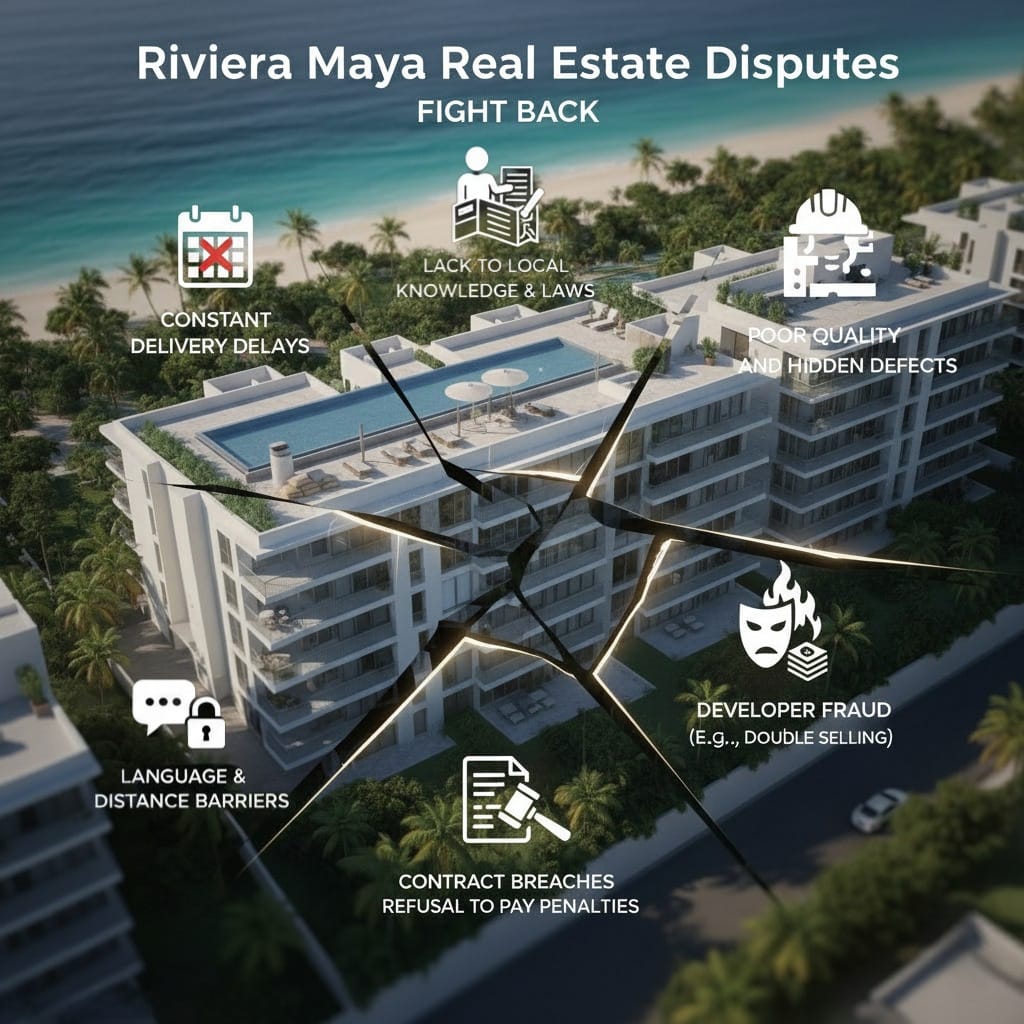Why Riviera Maya Real Estate Disputes Happen (And How to Fight Back)
A guide for foreign investors on developer fraud, contract breaches, and property delays in the Yucatan Peninsula.
The Riviera Maya is one of the fastest-growing real estate markets in the world. Places like Tulum, Playa del Carmen, and Mérida attract thousands of foreign investors. They are drawn by the lifestyle, beautiful properties, and strong tourism market.
Unfortunately, for many, this dream investment can quickly turn into a legal nightmare. Many foreign buyers find themselves in serious conflicts with real estate developers . These problems range from simple delays to outright fraud.
If you are facing a developer issue, you are not alone. More importantly, you are not powerless. This post will explain the common Riviera Maya real estate disputes, why they happen, and the legal steps you can take to protect your investment.
Why Foreign Investors Are Common Targets
Unscrupulous developers often target foreign buyers. This is not bad luck. It is a business strategy that relies on a few key vulnerabilities .
First, there is the language barrier. Your purchase contract will be in Spanish. This is a complex legal document. If you cannot read it perfectly, you must rely on a translation. Developers may offer a “helpful” translation or use their own lawyer to “explain” it . This is a major risk. Unfavorable clauses can be hidden in plain sight.
Second, the distance barrier is a major factor. You cannot monitor a construction site in Tulum from your home in New York or Toronto. You must rely on photos and email updates from the developer. This makes it easy for them to hide delays or poor-quality work until it is too late.
Finally, there is a lack of local knowledge. Mexican real estate law is different from US or Canadian law. The roles of the Notary Public, the rules of a fideicomiso (bank trust), and consumer protection laws are new concepts. Many buyers are also caught in “paradise syndrome”. They are so excited about the property that they rush decisions and trust people they shouldn’t .
Common Riviera Maya Real Estate Disputes
When a deal goes bad, it usually involves a few common problems. At PeninsuLawyers, these are the most frequent developer breaches we fight for our clients.
1. Constant Delivery Delays
This is the most common breach of contract. The developer promises your condo will be ready by a specific date in the contract. That date passes. You are given excuses about rain, permits, or materials. Meanwhile, your money is locked up, and you have no property to show for it. This is a clear breach of their obligation.
2. Refusal to Pay Penalties
Your contract might include a penalty clause. This clause states that the developer must pay you a certain amount for every month they are late. However, many developers simply ignore this. They delay the project and then refuse to pay the penalties they legally owe you. This is a second, separate breach of your agreement.
3. Poor Quality and Hidden Defects
Sometimes, the developer finally delivers the property. Unfortunately, it does not look like the glossy brochure. You may find cheap materials instead of the promised luxury finishes. Worse, you may discover “vicios ocultos,” or hidden defects. These are serious problems like bad plumbing, leaking roofs, or faulty electrical systems that were not visible on a simple inspection.
4. Developer Fraud
In the most serious cases, the problem is not just bad business. It is a crime. Developer fraud can include many things. A common example is a developer selling the exact same property unit to two or three different buyers. They may also take deposits for a project they have no intention of building. These actions are not just a breach of contract; they are criminal acts.
Your Legal Options Against a Developer
If you are facing one of these problems, you have powerful legal options. Mexican law provides strong protections for buyers, but you must act to enforce them .
Step 1: The Formal Demand Letter
The first step is not to sue. The first step is to have your independent lawyer send a formal demand letter. This carta de requerimiento is not a simple email. It is a formal legal document. It clearly outlines the developer’s breach of contract. It also states the specific remedy you demand (like paying penalties or finishing construction) by a firm deadline. This letter shows the developer you are serious and are building a legal case.
Step 2: PROFECO Conciliation
Your next powerful tool is PROFECO (Procuraduría Federal del Consumidor). This is Mexico’s federal consumer protection agency. As a foreign buyer, you have the full right to use their services . Your lawyer can file a formal complaint (queja) on your behalf. PROFECO will then summon the developer to a mandatory conciliation hearing. This process is highly effective for resolving many disputes, such as enforcing penalties or getting repairs for defects.
Step 3: Litigation (Civil Lawsuit)
When diplomacy and conciliation fail, you must go to court . This is your ultimate right. Your lawyer can file a civil lawsuit in the state where your property is located (Quintana Roo or Yucatan) . Depending on your case, you can sue for two main outcomes. You can demand “specific performance,” which asks a judge to force the developer to complete the property as promised. Alternatively, you can demand “rescission,” which cancels the contract and forces the developer to give you a full refund plus damages and interest.
You Don’t Have to Fight Alone
Investing in the Riviera Maya should be an exciting journey, not a source of stress. Facing Riviera Maya real estate disputes can make you feel isolated, especially when you are in another country. However, the law is on your side.
The key is to have an expert legal partner who represents only you. Never use the developer’s lawyer . An independent law firm that specializes in real estate dispute resolution is your best defense and your strongest weapon.
Facing a developer dispute or contract breach in the Riviera Maya? Don’t navigate it alone. Contact PeninsuLawyers to protect your investment and secure your property rights.



